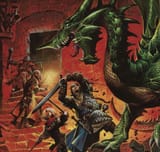Search Results
7/8/2025, 11:22:13 AM
>>714856895
In favour of 4e:
>Actual class balance due to proper delineation of roles. When "mage" is a theme rather than a role, you can easily find a support caster, debuffing caster, blaster caster, defensive caster etc rather than hoping the devs don't hate the idea of your specific combination of theme and role. This extends to other themes, you can have full, balanced parties with unified themes - a divine party consisting of a Paladin, Cleric, Avenger(holy-rogue), and Invoker(holy-wizard), a martial party with a Warlord acting as a healer/support, a fully psionic party, or a variety of different themes depending on your group's tastes
>Skill challenges and skill progression provide a better framework for out of combat actions than PF2e's equivalent systems
>Skill proficiencies actually work - You have your variety of skill proficiencies and you stay good at them. They even play into combat by unlocking unique abilities. In comparison, for PF2e, after level 5 or so you start actively getting worse at all but 3-6 skills(depending on your class) due to level scaling clashing with your limited amount of skill ups. You are more likely to persuade a peasant to give you information on a subject you need a lead on at level 1 than at level 16 unless you invest entirely into diplomacy, and even then you're not actually getting better, just staying on curve
>Variety of unique abilities give a menu of choices in each turn in combat to everyone. PF2e on the other hand is infamous for having MMO-style rotations where you use the optimal order of abilities each turn and any deviation screws you over. Even with the massive list of spells in 2e, you still have barely any options because there are only a few dozen that are worth learning across all ranks
>More unique and interesting magic items. Since it's expected that everyone will use them, you have all kinds of modifiers, set bonuses, and bespoke items for different classes and themes on top of your usual trinkets
Cont.
In favour of 4e:
>Actual class balance due to proper delineation of roles. When "mage" is a theme rather than a role, you can easily find a support caster, debuffing caster, blaster caster, defensive caster etc rather than hoping the devs don't hate the idea of your specific combination of theme and role. This extends to other themes, you can have full, balanced parties with unified themes - a divine party consisting of a Paladin, Cleric, Avenger(holy-rogue), and Invoker(holy-wizard), a martial party with a Warlord acting as a healer/support, a fully psionic party, or a variety of different themes depending on your group's tastes
>Skill challenges and skill progression provide a better framework for out of combat actions than PF2e's equivalent systems
>Skill proficiencies actually work - You have your variety of skill proficiencies and you stay good at them. They even play into combat by unlocking unique abilities. In comparison, for PF2e, after level 5 or so you start actively getting worse at all but 3-6 skills(depending on your class) due to level scaling clashing with your limited amount of skill ups. You are more likely to persuade a peasant to give you information on a subject you need a lead on at level 1 than at level 16 unless you invest entirely into diplomacy, and even then you're not actually getting better, just staying on curve
>Variety of unique abilities give a menu of choices in each turn in combat to everyone. PF2e on the other hand is infamous for having MMO-style rotations where you use the optimal order of abilities each turn and any deviation screws you over. Even with the massive list of spells in 2e, you still have barely any options because there are only a few dozen that are worth learning across all ranks
>More unique and interesting magic items. Since it's expected that everyone will use them, you have all kinds of modifiers, set bonuses, and bespoke items for different classes and themes on top of your usual trinkets
Cont.
Page 1
